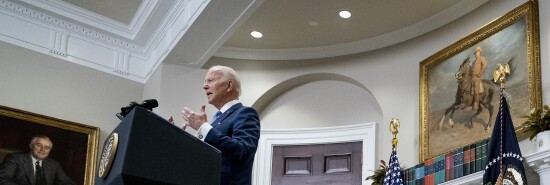
Neither party has a united stance on Ukraine — and it’s concerning
Max Mallhi
Video Embed
The Biden administration’s decision to send cluster munitions to Ukraine has created a policy fight at home, deepening the political mess that the war’s effects have created in the United States. This move has pushed the United States closer to war. All of this comes in the wake of the crucial upcoming 2024 presidential election.
Almost 50 House Democrats snubbed President Joe Biden’s move to send cluster munitions to Ukraine by voting for Rep. Marjorie Taylor Greene’s (R-GA) House Amendment 243 to the National Defense Authorization Act, which aimed to prohibit the transfer or sale of cluster munitions to Ukraine. Although the amendment failed in a 147-276 vote, the fact that 49 Democrats and 98 Republicans broke from their colleagues to vote for the amendment is an important development.
NO SPECIAL TAX BREAKS FOR WEALTHY BLUE STATE REPUBLICANS
The bipartisan effort against the White House’s decision created an unexpected alliance between the far-left “Squad” and members of the far-right Freedom Caucus such as Rep. Matt Gaetz (R-FL) and Rep. Lauren Boebert (R-CO). The lack of a clear consensus in both parties around a major policy issue such as this one is rare.
Ukraine’s potential membership in the North Atlantic Treaty Organization has also caused debate. When Sen. Lindsey Graham (R-SC) recently tweeted, “I will be working with Republicans and Democrats in the Senate to pass a resolution urging the admission of Ukraine into NATO,” he was met with sharp criticism from Greene, who called his position “madness,” and Sen. Rand Paul (R-KY), who responded, “Absolutely not”.
Other prominent conservatives, such as GOP presidential candidate Vivek Ramaswamy and conservative activist and founder of Turning Point USA Charlie Kirk, termed it “shameful” and called Graham a “warmonger.” This is in response to dire implications from Graham’s proposal, since according to NATO’s Mutual Defense Clause i.e. Article 5 of the treaty, an armed attack against one member state is perceived to be an attack on all members, calling for a collective response against the perpetrator. This has the potential to immediately trigger World War III, wherein American troops would have to be deployed on the battlefield.
But GOP presidential hopeful Mike Pence, an outspoken supporter of Ukraine, doesn’t seem as bothered as these conservatives by the idea that the United States would have to send troops to Russia. Rather, he warned of this exact possibility while reaffirming his commitment to support Ukraine and said that American troops may have to fight Russia on the ground. His stance is in stark opposition to former President Donald Trump’s anti-war message, in which he calls for a diplomatic approach and claims he can resolve Russian-Ukrainian differences and end the war in 24 hours should he take office as president. Tucker Carlson’s tough questions on Ukraine to presidential candidates and growing fire against pro-war members of Congress has only catalyzed this divide. Additionally, studies have shown that American voters are showing signs of impatience with the ongoing war.
In the end, the concerning part behind all of this is the divide within both the Democratic Party and the GOP on Ukraine policy. Moderates from both parties continue to support funding defense initiatives in Europe while those on the far left and far right have joined hands to oppose the threat of war. The two opposing policy stances, one being the militaristic and the other a diplomatic route, continue to spill over amongst different factions in each party. The policy mess around Ukraine is driving a concerning and questionable pattern where the policy path ahead is unclear and unpredictable, with no possibility of resolution in the near future.
CLICK HERE TO READ MORE FROM THE WASHINGTON EXAMINER
Max Mallhi is a summer 2023 Washington Examiner fellow.
